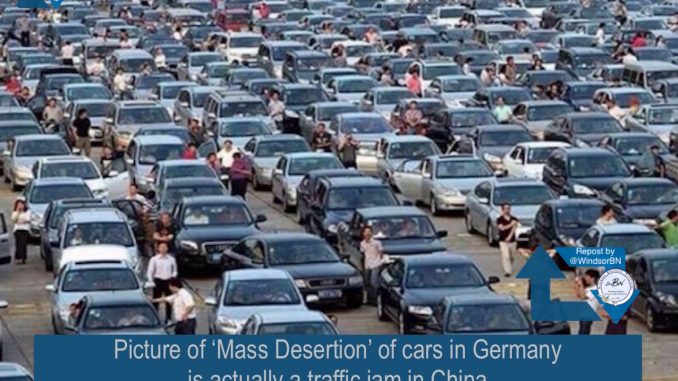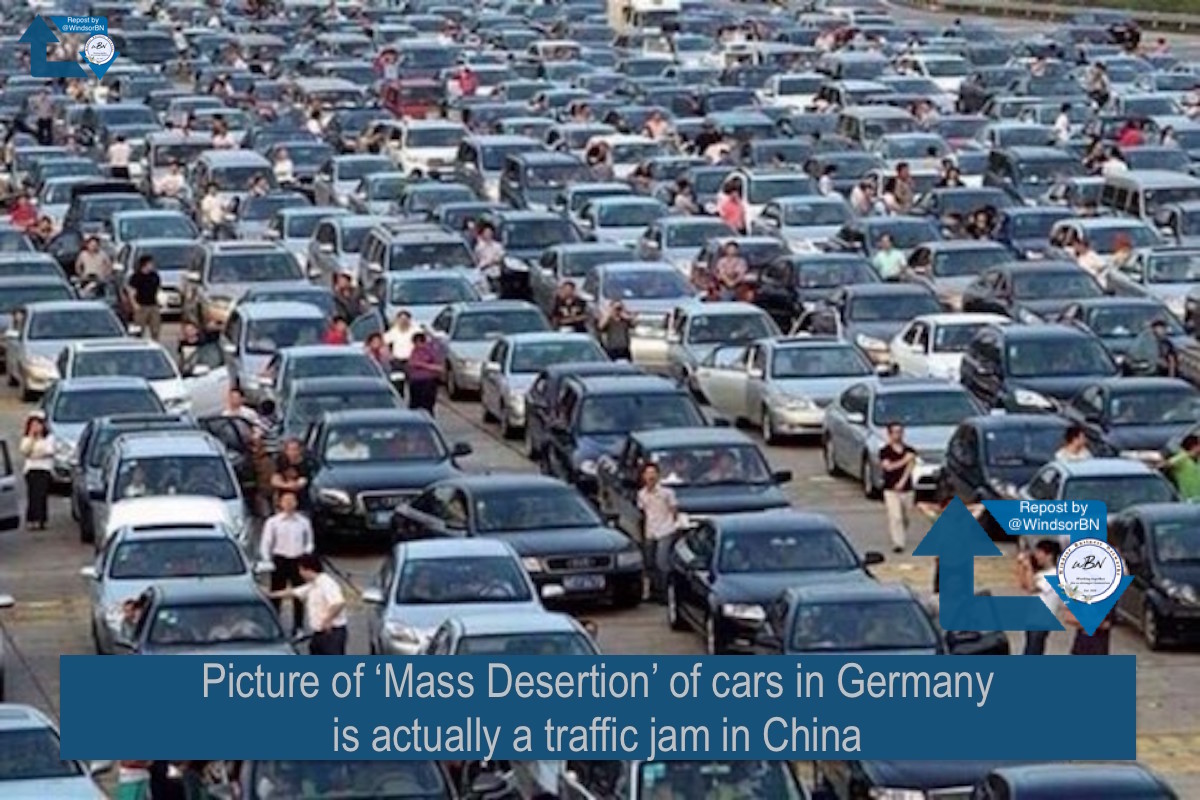
… is actually a traffic jam in China.

PETALING JAYA – A viral message with a picture purportedly showing a mass abandonment of cars in Germany in protest of a fuel price hike is in fact a huge traffic jam in China which happened two years ago.
The message which has been circulating on social media spins a story of angry German citizens abandoning their cars in protest after their government supposedly raised fuel prices.
“In just one hour of time people abandoned their cars on the streets and avenues and walked home.
“Over a million abandoned cars. They had to lower the price,” read the message.
According to the online portal of British newspaper The Telegraph, the bumper-to-bumper gridlock captured in the picture took place on the G4 Beijing-Hong Kong-Macau Expressway during the week-long National Day holiday in 2015.
The traffic jam was reportedly caused by a new toll station checkpoint, which cut down the lanes on the highway from 50 to 20, as well as foggy weather.
Germany, September 2000
Trucks, tractors and taxis brought traffic to a standstill in several German cities yesterday as protesters increased their demands for lower fuel prices.
The federal government in Berlin is holding firm against any across-the-board tax cuts on fuel but, under increasing pressure from opposition parties, is considering easing the fuel tax burden for those on low incomes.
As protests against high fuel prices eased elsewhere in Europe, unofficial blockades and go-slows spread east to Germany and Poland.
In the northern German city of Bremen, some 250 truckers, farmers and taxi-drivers blocked city-centre streets for several hours in a 5 km convoy that caused traffic chaos.
A blockade of the motorway and road network into the eastern city of Leipzig drew 300 farmers, fewer than the organisers were expecting.
Truckers also blocked a main motorway outside Berlin, causing a kilometre-long tailback.
Production at two car factories near the Belgian border came to a standstill yesterday as blockades by Belgian truckers had prevented the delivery of parts.
Although the border blockades have been lifted, production at the Ford factory in Saarlouis and the Opel factory in Bochum had still not returned to normal yesterday evening.
The German federation of cargo transporters has called for a national day of protest in Berlin later this month, but has so far been slow to sanction other action. Under German law truckers would have to pay hefty compensation to anyone inconvenienced by blockades they had sanctioned.
The federal government has so far refused to reduce the so-called “eco-tax” on petrol, diesel and heating oil it introduced last year. Imposing the environmental tax was an attempt by the government to kill two birds with one stone – save the overstretched pensions system and reduce fuel consumption.
The Chancellor, Dr Gerhard Schroder, has met his Finance Minister, Mr Hans Eichel, to discuss possible concessions on fuel taxes for pensioners and those on low incomes. But he continues to rule out an all-round reduction in fuel tax.
The opposition Christian Democratic Union has stepped up its campaign against the eco-tax. On Thursday it distributed bumper stickers to motorists in Berlin. Its sister party in Bavaria, the Christian Social Union, distributed postcards yesterday to motorists so they could tell the government how unhappy they are with “Schroder’s rip-off tax”.
The opposition parties introduced a motion in parliament yesterday calling on the government to remove the eco-tax by the end of the year, before the tax is scheduled to rise again.
Some 81 per cent of Germans support postponing the next eco-tax rise, according to survey results issued yesterday evening.
The increase will see the price of a litre of petrol increase by seven pfennings (almost 3p). The average price of a litre of premium unleaded in Germany rose by four pfennigs on Wednesday to more than DM2 (80p), of which 68 per cent is a combination of sales tax and the eco-tax.
German industry chiefs are also unhappy with the eco-tax. The head of the giant Siemens group criticised the government yesterday, saying the eco-tax was hindering Germany’s economic upswing. “The eco-tax is a step in the wrong direction as it makes production in Germany more expensive,” Mr Heinrich von Pierer told the Bild newspaper.
The German edition of the Financial Times reported yesterday that the Group of Seven industrial nations, led by Britain, will next week press the organisation of oil-producing nations, OPEC, to start cutting prices.
German government sources told the newspaper there had yet to be any direct contact among the G7 heads of state on the matter.
The paper said lower prices could be achieved by another increase in oil production. OPEC announced a production increase of 800,000 barrels a day last weekend, adding that it would boost supplies again if required by the market.
